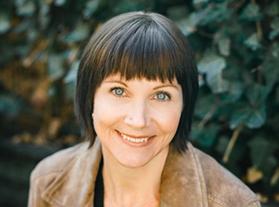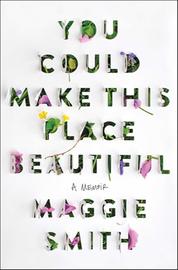
|
|
| (credit: Devon Albeit Photography) | |
Maggie Smith is a poet, author, and creative writing teacher whose award-winning poetry collections include Good Bones and Goldenrod. Her book Keep Moving offered notes and musings on loss, creativity, and change. Smith has an MFA from Ohio State University and lives in Ohio with her two children. In her memoir in vignettes, You Could Make This Place Beautiful (Atria, reviewed in this issue), she explores grief, loss, divorce, and coming into one's self as an adult.
You are perhaps best known for your poetry, which explores many of the same themes found in your memoir, You Could Make This Place Beautiful. What drew you to write this in vignettes, instead of verse?
Whenever I approach any piece of writing, I'm always asking myself what the best form is to enact or embody the experience I'm writing about, so that form and content work together.
It didn't really make any sense to tell it in a different way because of the way that memory works associatively. The experiences in the book are marked by fragmentation and recursion and rumination and thinking back and processing grief and loss. I wanted the reader to feel the experience instead of just being told about the experience. I had to make the form as psychologically true as I could.
I'm a whittler, always looking for ways to trim connective tissue, cut the fat, ask myself questions about what's essential, what I can let go, where I can let a metaphor or image do the talking for me. It's a poet's memoir; I knew I would be coming to this book as a poet. I enter every writing project as a poet. It doesn't matter if I'm writing a book review for the Post or an e-mail (I probably e-mail like a poet). I had to write it my way, and my way tends to be writing small over and over. Even the chapters are short, and rely on the same tools that I rely on in poems: juxtaposition, associative leaps, image, metaphor, sound, rhythm, repetition.
 Continuing to think of this as a poet's memoir, does it feel fair to say this book pushes the traditional definition of what a memoir is?
Continuing to think of this as a poet's memoir, does it feel fair to say this book pushes the traditional definition of what a memoir is?
I read a lot of books that gave me permission to write this way. As I was thinking my way into this book, I read a lot of books, like Carmen Maria Machado's In the Dream House, Nick Flynn's memoir, and Lidia Yuknavitch's The Chronology of Water. All of these books that did unusual things within the genre, and I thought, if they're doing it, I can take some risks.
Sometimes the traditional or conventional way doesn't allow you to access everything you need to access. It's just something telling you to push at it, and challenge it, and find a way to do things slightly differently. It might end up looking in such a way that I don't expect. This book, I didn't know what it would look like when it was done. One bit at a time.
That also feels very in sync with the story you're telling: one foot in front of the other, one small movement at a time. It's not like you wake up one day and everything in your life is resolved.
Yes--and it's not like you look back one day and think, "Oh! Now it all makes sense, I will synthesize it all and share what I've learned with you." Form follows function, so if the function is to help the reader feel the confusion and fragmentation and revelation and surprise and mystery in these experiences, I didn't know how else to do it other than in this way.
Something I've been thinking about a lot in life is and, not but. That's what life is. It's messy, and unexpected things happen all the time. I think poetry is sort of a sweet spot for holding seemingly oppositional emotions or impulses in the same compact space. It's sometimes more painful to live with that in life than it is on the page. But that kind of tension underlies really everything we do, that and-ness.
The goal is not necessarily to resolve that tension but find peace with it.
For me, writing is how I do that. Processing on the page as a way of exploring what I think. I really didn't know what I thought about this until I wrote about it, and now I'm seeing the connections between things. Which writing allows and invites us to do, to synthesize parts of our life we might not be able to do otherwise.
Some have called this a book about divorce. Do you think your memoir will resonate with readers whether or not they’ve even been married, let alone divorced?
I think in some ways the spark of the book, the thing that dragged me to the page and made me write this book was re-evaluating my life post-divorce. If Keep Moving is the book I wrote as I was trying to move and press forward through that time, You Can Make This Place Beautiful is where I got to stop and breathe and reckon with the past in an effort to make peace with it.
But it's not a book about divorce, it's a book more about figuring out how to come home to yourself, particularly in middle age. Part of that is evaluating your choices, part of that is looking at the paths you took or did not take. A lot of that is having self-compassion, and self-forgiveness. In some ways it's a book about the choices we make throughout our lives; sometimes the choices we make in our 20s don't serve us in our 30s, or 40s, or 50s.
It's asking, Who am I now? What are my priorities? How do I take care of myself and honor myself? How do I get out of a habit of prioritizing everyone else before myself?
In that vein of holding space and honoring yourself: In addition to writing this book, what have you done to take care of yourself lately? Anything fun?
I take care of myself with therapy, though I wouldn't call it fun. (Although my therapist does have a sense of humor. I can make her laugh, and I always love to make my therapist laugh. I get a gold star.) And I love writing, but writing is a way of processing. It's fun in that it's rigorous and challenging, but it's not a party. (Writing: Not a Party!)
Really the way I take care of myself is with my people, and also taking time alone when I need it, because I am an introvert--albeit a gregarious one. I need long walks by myself with my headphones on, or the occasional roller-skate with friends. I need time with my kids to just play: a dance party, watching a movie together, cooking together, baking together, something where we're all talking and laughing. Spending time with my parents, sisters, brothers-in-law and my friends. It's spending time with my people.
I said this is not a divorce book, but one of the things that's most unmooring about the end of a long relationship is that it makes you realize, I was this person with this person for this many years, so who am I now? I'm having to hit a hard reset. What are the factory settings? What remains of me? What parts of me pre-dated this relationship, what's still there? The really great thing about friends and family that have known you for a long time is that they remind you that at the end of the day, you're still yourself. --Kerry McHugh, freelance writer

